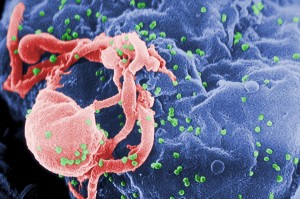Happy Fun Science FRIEDay
After a hiatus, I hope to get back to regularly writing these pieces. This week I was particular inspired to focus on an article I read about the discovery of the origins of the human immunodeficiency virus (HIV) and subsequently the origins of AIDS.

Photo Credit: Centers for Disease Control (CDC)
AIDS burst onto the scene like a bat out of hell, wreaking havoc on an unsuspecting human population. First recognized in the early 1980s by the Centers for Disease Control and Prevention, better known as the CDC), AIDS went on to cause approximate 36 million deaths globally becoming one of the most devastating diseases in human history. But where did this affliction come from and what were the chain of events that led to the pandemic?
